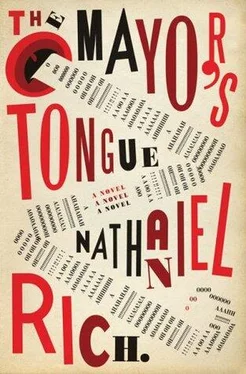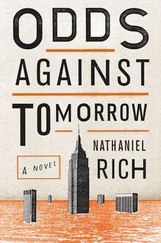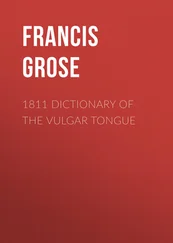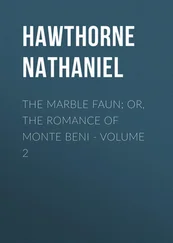Keftir did not answer any of Eugene's questions about Idaville or about Eakins, but walked on, his head cocked to one side.
"Some people are watchers," said Keftir, all of a sudden. "Others are watched."
"What on earth—"
"I'm leaving for good," said Keftir. He turned sharply to face Eugene. "If you're smart you'lljoin me."
"Please tell me — what happens in this town?"
"They worship the Mayor."
"You mean Eakins? So he is alive?"
"He's as virile as a seventeen-year-old. He feeds off of the adulation and love of his minions. He is a glutton of life. He eats and eats and eats. He is a wildcat. A lion. Goliath."
"Wait!" said Eugene. "Before you go — I have to ask. Are you the model for 'Keftir the Blind'? Or do you just take your name from him?"
"Ha!" said Keftir, flashing his vitreous eyeballs. "I am Keftir the Blind."
The painter turned and walked herky-jerky down the rock path to the long valley beyond.
Eugene clutched Alvaro's manuscript through his book bag like a talisman and decided he wouldn't be worth much if he didn't keep going. After all, does Jacinto give up, in the middle of the Dominican jungle, when he's confronted with shinefish bites or cannibal attacks or mud paths overrun by jungle vermin? Of course not. Alsa is awaiting him.
Eugene went on, and after several minutes he found himself at the end of the trail. The rock faces ended abruptly in a high scrabbly cliff. Eugene was standing at the edge of town.
Idaville stood on flat ground. Two rows of houses faced each other across a main road paved with loose gravel. This road ran the length of the town, about two hundred meters, where it ended at a large black iron gate. Every house was painted red and had been built with identical dimensions, porches, and backyards. A breeze from the Adriatic, smelling faintly of cleaning chemicals, shifted the gravel and swept debris down the street toward Eugene. This debris, he soon realized, was notebook paper— ripped, stripped, balled, and ink-stained.
There was no sign of Enzo, but the street was busy with pedestrians, out for an afternoon stroll. Many of them seemed familiar with one another, and ambled together in leisurely clusters. That is, until they noticed Eugene, standing alone at the end of the street. He felt acutely aware of the holes in his slacks and the stains covering his shirt. The townspeople stopped and cautiously turned to face him, hiding their mouths behind curled hands, whispering to each other and shaking their heads. A disproportionate number of the citizens, Eugene realized, were young, stunningly beautiful women.
"Hello," said Eugene. He lifted his hand in greeting. A ruddy-faced Chinese boy, no older than seven, charged a few steps forward and tossed a twig, which landed by Eugene's feet. The boy's mother grabbed him by the collar, slapped him twice, and pulled him close to her chest. She gave Eugene a sharp look of reproach.
A cocky young man, about Eugene's age, called out to him.
"Who are you? Where did you come from?"
"I'm Eugene," he said. The crowd instinctively lurched back. Muffled conversations broke out all around him.
"I hiked up through the Carso," he added. "I'm from America."
Eugene caught fragments of confused dialogue here and there. He was relieved, if puzzled, that they all spoke English. "But he hasn't published for years," said one woman.
"What's your story?" one woman asked Eugene.
"Who're you with?" asked another.
"What's it like in America now?"
"Do you know why you're here?"
"What's your story?"
Eugene began to notice how diversely attired the townspeople were. One woman had a gray fleece and purple sneakers with untied laces; another woman, caramel-skinned with piercing green eyes, wore what looked like an ancient Mexican headdress; a small band of rosy-cheeked men, each of them about three feet tall, dressed in green tunics and carried pickaxes.
"I'm Eugene Brentani," said Eugene, and the crowd grew quiet and attentive. "I'm looking for a girl named Alison Chisholm. She also goes by Sonia, Alicia, Alice, or Agata."
He received looks of skepticism and pity. A kindly, wide-eyed man, dressed in a doctor's white coat, stepped forward.
"If she's from your story, she should be along soon," he said. "Just be patient."
Eugene tried again.
"She's about twenty-two years old, with auburn hair and gray eyes, and she has a little white scar under her left eye. She's beautiful."
"Sounds like the Mayoress," said one teenage girl, and several women tittered.
"What's your story, anyway?" asked the doctor.
"My story is just that I met Sonia, she disappeared, and I want to find her."
"But what happens exactly? What comes next?"
"I don't know yet. That's why I'm looking for her."
"He's still doped," someone suggested. "He doesn't realize what's happened to him."
Furious debate broke out everywhere.
"She has a small overbite," Eugene continued, raising his voice in an effort to regain the crowd's attention. "She has a long neck. She laughs very loudly."
"Maybe he's a real tourist," said someone, and the conversational din redoubled.
"If you're really from America, then tell us something about your childhood there," someone else called out — a tall, dark man wearing a fedora and a trench coat.
"What does that have to do with anything?"
"See! Told you—"
"No reason to worry—"
"He's one of us, one of us—"
"OK!" said Eugene. "I was born at New York Hospital on a leap year. My mother died when I was young and I was raised by my father, who is Italian and speaks very little English. We didn't have a great relationship."
"The most predictable details!"
"He's barely his own person. A cliché. The Mayor is getting senile."
"My first-grade teacher was Ms. Martin," continued Eugene. "My second-grade teacher was Ms. Murphy. My third-grade teacher. ."
He could tell that this was rattling some of the townspeople. He recited all the phone numbers of his high school friends that he could remember, and then their birthdays.
"A long story, perhaps."
"A novella. Maybe a realist novel. Facts and meaningless minutiae posing as reality."
Eugene gave his Social Security number; his mother's maiden name; his birthday; his zip code; his shoe size; his SAT scores; the name of every girl he had ever kissed. The crowd listened intently, straining to hear every word. Finally, to the great consternation of his audience, Eugene recited historical facts and math equations; he gave the names of the last five Super Bowl champions and the members of the New York Mets' starting rotation. He listed Supreme Court justices, gave Alvaro's recipe for rice and beans, and talked about the last movie he'd seen. His audience went silent.
"He's not one of us."
"He's an intruder."
"Villain! Outsider! Alien!"
The crowd moved in closer. A bodybuilder was pounding his fist into his open palm. A cowboy reached for his holster. A matronly woman with blood in her eye rolled up her sleeves.
"Criminal!"
"Gangster!"
"Demon!"
"Chiseler! Pornographer! Slave!"
"Thief!"
"Wait! Wait!" A hoarse, bright female voice rang out. "Leave him alone!"
She jostled through the churning crowd, rushing toward Eugene. He yelled her name.
"Sonia!"
For one, Mr. Schmitz has to tell Rutherford about Daniel. Daniel is a fraud, a demon. He is not a friend — and he's certainly not his son. Mr. Schmitz then has to explain to Rutherford that he sent Daniel back to the apartment to squat there until the cops, whom he telephoned, come to arrest him. A nice man from the hospital will, for a small fee, collect all Rutherford's clothes, private effects, and necessary books (the American ones, that is) and he will send them to our new home as soon as we give him an address.
Читать дальше












